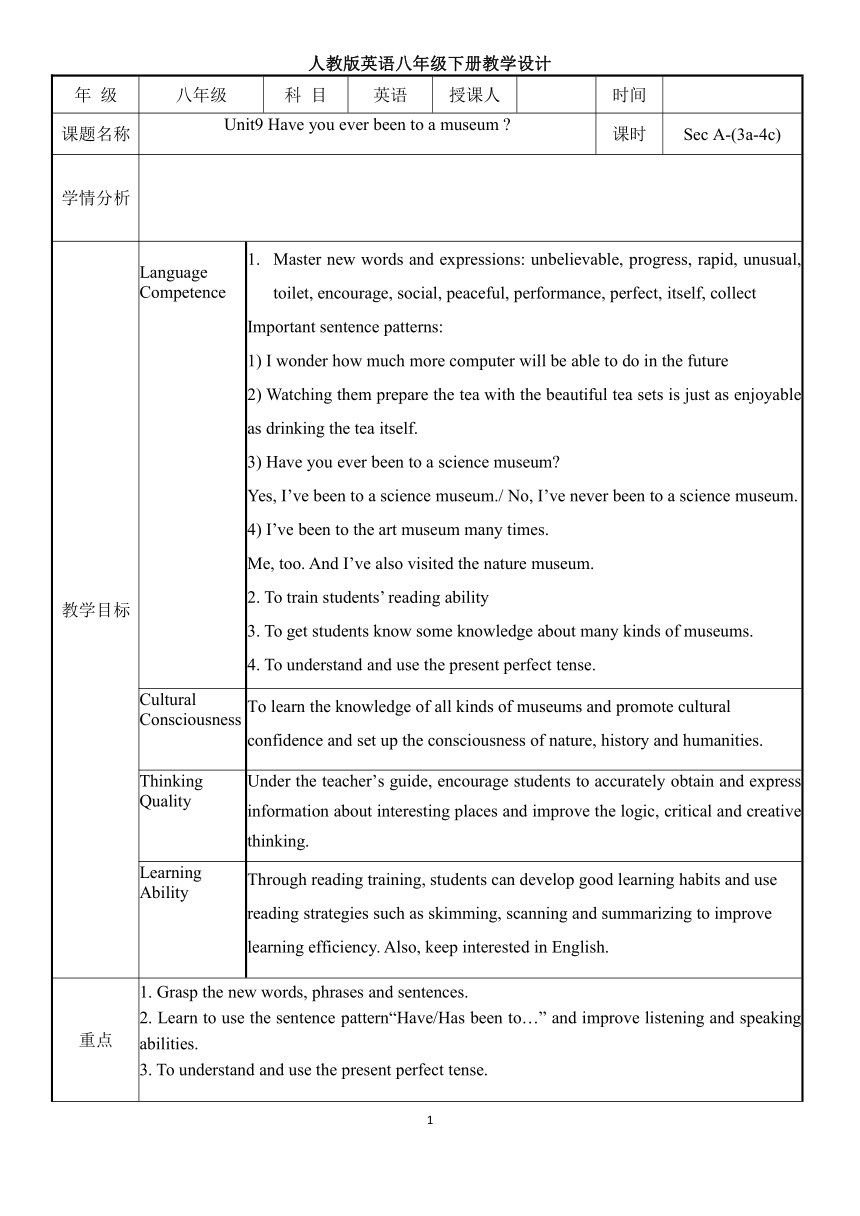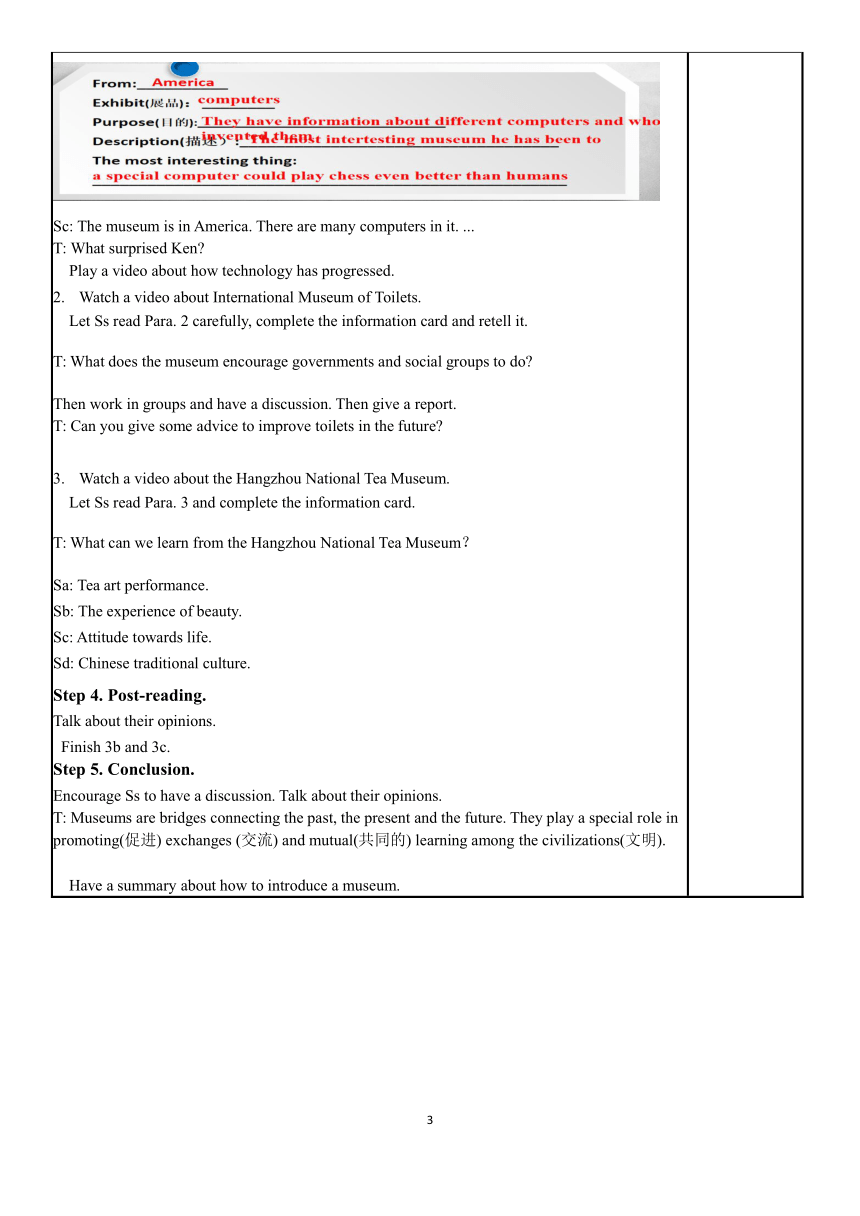八下Unit 9 Have you ever been to a museum? SectionA(3a-4c )教案(表格式)
文档属性
| 名称 | 八下Unit 9 Have you ever been to a museum? SectionA(3a-4c )教案(表格式) |

|
|
| 格式 | docx | ||
| 文件大小 | 2.6MB | ||
| 资源类型 | 教案 | ||
| 版本资源 | 人教新目标(Go for it)版 | ||
| 科目 | 英语 | ||
| 更新时间 | 2024-09-23 00:00:00 | ||
图片预览



文档简介
人教版英语八年级下册教学设计
年 级 八年级 科 目 英语 授课人 时间
课题名称 Unit9 Have you ever been to a museum 课时 Sec A-(3a-4c)
学情分析
教学目标 Language Competence Master new words and expressions: unbelievable, progress, rapid, unusual, toilet, encourage, social, peaceful, performance, perfect, itself, collect Important sentence patterns: 1) I wonder how much more computer will be able to do in the future 2) Watching them prepare the tea with the beautiful tea sets is just as enjoyable as drinking the tea itself. 3) Have you ever been to a science museum Yes, I’ve been to a science museum./ No, I’ve never been to a science museum. 4) I’ve been to the art museum many times. Me, too. And I’ve also visited the nature museum. 2. To train students’ reading ability 3. To get students know some knowledge about many kinds of museums. 4. To understand and use the present perfect tense.
Cultural Consciousness To learn the knowledge of all kinds of museums and promote cultural confidence and set up the consciousness of nature, history and humanities.
Thinking Quality Under the teacher’s guide, encourage students to accurately obtain and express information about interesting places and improve the logic, critical and creative thinking.
Learning Ability Through reading training, students can develop good learning habits and use reading strategies such as skimming, scanning and summarizing to improve learning efficiency. Also, keep interested in English.
重点 1. Grasp the new words, phrases and sentences. 2. Learn to use the sentence pattern“Have/Has been to…” and improve listening and speaking abilities. 3. To understand and use the present perfect tense.
难点 1) How to improve reading skill. 2) To understand the passage and the culture. 3) To understand and use the present perfect tense.
教学过程 集体教研
Step 1. Lead in Have a free talk with T. T: What can you think of when we talk about the museum Ss: Old things / History / Art / Culture / Record / ... T: A museum is a development history of materialization. It is like the long river of history , conveying the stories of the past in an endless stream.Can you believe there are all kinds of museums in our world Step 2. Pre-reading. Enjoy a video about different kinds of interesting museums. Step 3. While-reading. Fast reading. Ask Ss to read the passages quickly and find out the names of these museums. T: Do you know the names of these museums Who are talking about the three museums Sa: American Computer Museum, International Museum of Toilets and Hangzhou National Tea Museum. Sb: Ken, Amy and Linlin. Careful reading. Let Ss read Para. 1 carefully and find out the information according to the tips. Then guide them to introduce the computer museum based on the card. Sc: The museum is in America. There are many computers in it. ... T: What surprised Ken Play a video about how technology has progressed. Watch a video about International Museum of Toilets. Let Ss read Para. 2 carefully, complete the information card and retell it. T: What does the museum encourage governments and social groups to do Then work in groups and have a discussion. Then give a report. T: Can you give some advice to improve toilets in the future Watch a video about the Hangzhou National Tea Museum. Let Ss read Para. 3 and complete the information card. T: What can we learn from the Hangzhou National Tea Museum? Sa: Tea art performance. Sb: The experience of beauty. Sc: Attitude towards life. Sd: Chinese traditional culture. Step 4. Post-reading. Talk about their opinions. Finish 3b and 3c. Step 5. Conclusion. Encourage Ss to have a discussion. Talk about their opinions. T: Museums are bridges connecting the past, the present and the future. They play a special role in promoting(促进) exchanges (交流) and mutual(共同的) learning among the civilizations(文明). Have a summary about how to introduce a museum. Step 6. Grammar focus. Review Complete the sentences Present perfect tense 定义:表示过去发生或已经完成的某一动作对现在造成的影响或结果. 构成: 时间状语 already, yet, ever, never,
just, before, several times 等. 一般过去时和现在完成时 I have seen the film. 我看过这部电影。(我了解这部电影的内容。) I saw the film last month. 我上个月看了这部电影。(只说明上星期看了这部电影,不涉
及现在的情况) Practice 1)4a. Put the correct forms of the verbs in the blanks. 2)4b. Fill in the blanks with the correct forms of the verbs in brackets. 3)4c. Answer the survey questions and then ask your partner.
Unit 9 A(3a---4c)
教学反思
年 级 八年级 科 目 英语 授课人 时间
课题名称 Unit9 Have you ever been to a museum 课时 Sec A-(3a-4c)
学情分析
教学目标 Language Competence Master new words and expressions: unbelievable, progress, rapid, unusual, toilet, encourage, social, peaceful, performance, perfect, itself, collect Important sentence patterns: 1) I wonder how much more computer will be able to do in the future 2) Watching them prepare the tea with the beautiful tea sets is just as enjoyable as drinking the tea itself. 3) Have you ever been to a science museum Yes, I’ve been to a science museum./ No, I’ve never been to a science museum. 4) I’ve been to the art museum many times. Me, too. And I’ve also visited the nature museum. 2. To train students’ reading ability 3. To get students know some knowledge about many kinds of museums. 4. To understand and use the present perfect tense.
Cultural Consciousness To learn the knowledge of all kinds of museums and promote cultural confidence and set up the consciousness of nature, history and humanities.
Thinking Quality Under the teacher’s guide, encourage students to accurately obtain and express information about interesting places and improve the logic, critical and creative thinking.
Learning Ability Through reading training, students can develop good learning habits and use reading strategies such as skimming, scanning and summarizing to improve learning efficiency. Also, keep interested in English.
重点 1. Grasp the new words, phrases and sentences. 2. Learn to use the sentence pattern“Have/Has been to…” and improve listening and speaking abilities. 3. To understand and use the present perfect tense.
难点 1) How to improve reading skill. 2) To understand the passage and the culture. 3) To understand and use the present perfect tense.
教学过程 集体教研
Step 1. Lead in Have a free talk with T. T: What can you think of when we talk about the museum Ss: Old things / History / Art / Culture / Record / ... T: A museum is a development history of materialization. It is like the long river of history , conveying the stories of the past in an endless stream.Can you believe there are all kinds of museums in our world Step 2. Pre-reading. Enjoy a video about different kinds of interesting museums. Step 3. While-reading. Fast reading. Ask Ss to read the passages quickly and find out the names of these museums. T: Do you know the names of these museums Who are talking about the three museums Sa: American Computer Museum, International Museum of Toilets and Hangzhou National Tea Museum. Sb: Ken, Amy and Linlin. Careful reading. Let Ss read Para. 1 carefully and find out the information according to the tips. Then guide them to introduce the computer museum based on the card. Sc: The museum is in America. There are many computers in it. ... T: What surprised Ken Play a video about how technology has progressed. Watch a video about International Museum of Toilets. Let Ss read Para. 2 carefully, complete the information card and retell it. T: What does the museum encourage governments and social groups to do Then work in groups and have a discussion. Then give a report. T: Can you give some advice to improve toilets in the future Watch a video about the Hangzhou National Tea Museum. Let Ss read Para. 3 and complete the information card. T: What can we learn from the Hangzhou National Tea Museum? Sa: Tea art performance. Sb: The experience of beauty. Sc: Attitude towards life. Sd: Chinese traditional culture. Step 4. Post-reading. Talk about their opinions. Finish 3b and 3c. Step 5. Conclusion. Encourage Ss to have a discussion. Talk about their opinions. T: Museums are bridges connecting the past, the present and the future. They play a special role in promoting(促进) exchanges (交流) and mutual(共同的) learning among the civilizations(文明). Have a summary about how to introduce a museum. Step 6. Grammar focus. Review Complete the sentences Present perfect tense 定义:表示过去发生或已经完成的某一动作对现在造成的影响或结果. 构成: 时间状语 already, yet, ever, never,
just, before, several times 等. 一般过去时和现在完成时 I have seen the film. 我看过这部电影。(我了解这部电影的内容。) I saw the film last month. 我上个月看了这部电影。(只说明上星期看了这部电影,不涉
及现在的情况) Practice 1)4a. Put the correct forms of the verbs in the blanks. 2)4b. Fill in the blanks with the correct forms of the verbs in brackets. 3)4c. Answer the survey questions and then ask your partner.
Unit 9 A(3a---4c)
教学反思
同课章节目录
- Unit 1 What's the matter?
- Section A
- Section B
- Unit 2 I'll help to clean up the city parks.
- Section A
- Section B
- Unit 3 Could you please clean your room?
- Section A
- Section B
- Unit 4 Why don't you talk to your parents?
- Section A
- Section B
- Unit 5 What were you doing when the rainstorm came
- Section A
- Section B
- Review of Units 1-5
- Unit 6 An old man tried to move the mountains.
- Section A
- Section B
- Unit 7 What's the highest mountain in the world?
- Section A
- Section B
- Unit 8 Have you read Treasure Island yet?
- Section A
- Section B
- Unit 9 Have you ever been to a museum?
- Section A
- Section B
- Unit 10 I've had this bike for three years.
- Section A
- Section B
